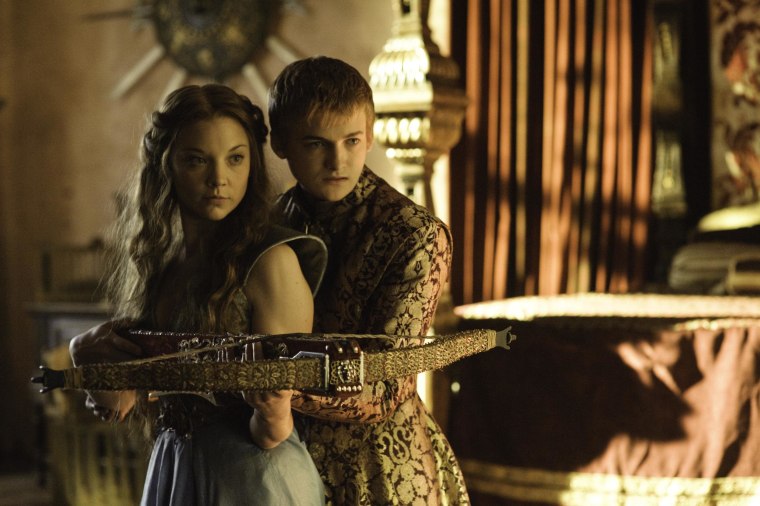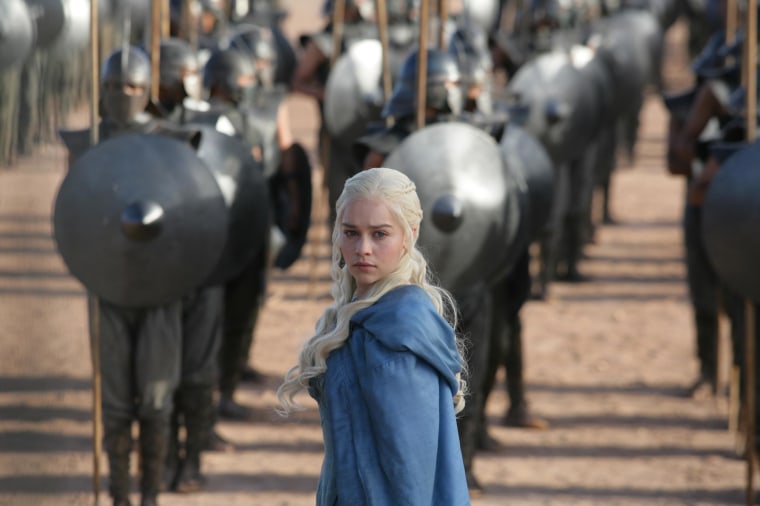In the world of George R.R. Martin's "A Song of Ice and Fire" — and the HBO series "Game of Thrones," which is based on the series — it's not just the fire-breathing dragons that drive the plot, but gold dragon coins.
While Martin's tales of White Walkers, direwolves and dwarves may seem as far from the mundane world of modern-day finance and politics as possible, many have spotted the economic lessons some of the characters should have learned before they embarked on their quest for power.
Here's a look at the business behind the battle for the Iron Throne.
The Iron Bank — Westeros' IMF?
"The Iron Bank will have its due," is not as widely recognized a phrase as the Stark family motto "Winter is Coming," but it may end up being almost as important to the outcome of the series.
"Whether history or fantasy, the game of thrones prevents the spread of sound economic ideas, and precludes good economic policies," Matt McCaffrey, a post-doctoral academic in liberal and integrative studies at the University of Illinois who has written previously about the economics of "Game of Thrones," told CNBC via email.
The Seven Kingdoms of Westeros is pretty much a basic feudal economy, generating very little income of its own. Instead, it has turned to the nearby Free Cities — each of which has a bank and a thriving trade in spices, cloths or slaves — for loans to fund its campaigns.

The Iron Bank, located in city-state of Braavos, seems to be the most powerful. The Bank appears to be an example of a "too big to fail" lender — so if one king or another doesn't start paying its debts, there could be trouble ahead. This is a real case of example of "sovereign debt."
Tycho Nestoris, the most prominent envoy of the Bank, is being introduced to the TV show this season — earlier than in the books. He is played by well-known British actor Mark Gatiss. HBO confirmed "this part of the story is quite integral" to season 4, which begins Sunday.
It can be said that Cersei Lannister's hold on the throne starts to weaken not when rumors start about who is the real father of her children, but when she stops paying the Iron Bank. Unfortunately for her, the throne is distinctly sub-prime at this point, and the Iron Bank quickly transfers allegiance to her enemy, Stannis Baratheon.
"The Iron Bank is always glad to be of service."
So is the Iron Bank a little like the International Monetary Fund or World Bank in backing particular horses in one country? Well, for example, there were rapid changes of governments in the euro zone's stricken countries as they struggled to impose austerity measures imposed by international lenders like the International Monetary Fund during the region's debt crises.
The Feudal Fed
Littlefinger is Westeros' Master of the Coin, and as the books describe, has "a gift for rubbing two golden dragons together and breeding a third."
Like the modern-day Federal Reserve, it seems as though he has been doing his own version of quantitative easing by injecting more gold dragons into the economy (although in a rather less sophisticated way, by clipping coins to create more money). He has also jeopardized the royal family's economic status by borrowing heavily from the Iron Bank and raising taxes. And he has helped build a thriving business in the city's red light district through loans to himself from the crown (from the money he has borrowed on its behalf).
The Peasants Are Revolting
In her attempts to manage her kingdom, Cersei has followed the age-old maxim of deploying "bread and circuses" — the method of keeping commoners happy in an undemocratic society described by Latin philosopher Juvenal. But when the bread stops coming, and prices inflate, as the countryside is ravaged by war, the people of King's Landing get restive, no matter how elaborate a tourney or wedding is put on to distract them. Especially once there starts being a tax on brothels.
Her family has lent much of its vast wealth to the crown, which is likely to prove about as good an investment as mortgage-backed securities in 2007.
Raising taxes may have partly helped to keep the crown afloat, but has also driven unhappy smallfolk to the city. And, of course, winter is coming, and waging war has destroyed much of Westeros' agricultural economy. Cersei may want to set up a Bank of Lannisport, but it looks like that's come too late.
What Next for Westeros?
One of the few reasonably developed industries in Westeros is defense, with ships and mercenaries increasingly sought-after, and piracy one of the best ways to climb up the social scale. The Iron Bank is backing much of the mercenary purchases.
In an excerpt from the sixth book released online, one of the claimants for the Iron Throne, Stannis signs for his debts — and those of the other kings of Westeros — in blood. He may think Nestoris "a worse pirate than (notorious pirate) Salladhor Saan," but he doesn't have a lot of choice to raise more money to help in his campaign.
Braavos is also where the mysterious Faceless Men assassins live — and where Lord Varys, the power behind the Iron Throne, comes from. If a closer connection between them and the Bank emerges in future books, the Bank will be even more powerful than thought.
"The Iron Bank is always glad to be of service," Tycho Nestoris tells Stannis in one of the pre-released chapters of the next book in the series, Winds of Winter. But ultimately, the players in this game may all, unbeknown to them, be serving the Bank.
